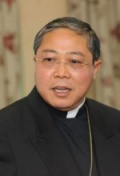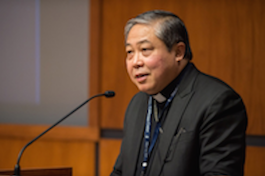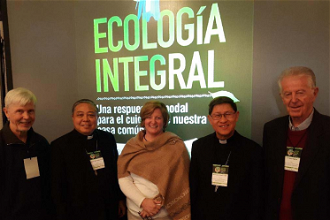Vatican envoy tells UN: Spiritual dimensions cannot be ignored in sustainable development

Archbishop Auza
Holy See's Permanent Observer to the United Nations, Archbishop Bernardito Auza, said the UN 2030 Agenda for Sustainable Development "depends upon going beyond the language of economics and statistics," adding that "considerations of a moral, spiritual and religious dimension cannot be ignored without serious detriment to the person's development."
"Starting from this principle of equal dignity, a new person-centered paradigm in development emerges, making everyone, including the poor and the marginalized, active agents rather than passive beneficiaries of development," the Vatican diplomat said on Tuesday.
"Sustainable development will always be a public-private partnership, requiring both honest government and equally honest businesses," - Archbishop Auza concluded - "Both require leaders who can inspire and direct these institutions, their systems and their practices. My delegation therefore encourages national efforts, particularly in developing countries, that foster both the good governance and honest entrepreneurship that sustain and foster integral human development."
The full statement follows:
Statement by HE Archbishop Bernardito Auza Apostolic Nuncio, Permanent Observer of the Holy See Seventy-first Session of the United Nations General Assembly Second Committee Agenda Item 19: Sustainable Development
Mr Chair,
The Preamble of the 2030 Agenda for Sustainable Development states that the goals and targets enumerated therein "are integrated and indivisible and balance the three dimensions of sustainable development: economic, social and environmental," with the human person at the heart of the Agenda. The success of the 2030 Agenda depends upon going beyond the language of economics and statistics precisely because the real emphasis must be on the human person. Therefore, considerations of a moral, spiritual and religious dimension cannot be ignored without serious detriment to the person's development. The Holy See prefers to call this wider and fuller understanding of a person-centered development as "integral human development," which includes sustainable development.1
Mr Chair,
Past reports of the Secretary General on Entrepreneurship for Development have noted that the transition from promoting economic growth at all costs to an agenda of sustainable development calls for a "paradigm shift in development thinking." This shift is not merely a change affecting policies and institutions: it also demands a change in the relationships among peoples as well as between human beings and the environment, our common home.
This new development mindset must start with an understanding of the inherent dignity of each person and the centrality of the common good to all social goals and efforts. Only such foundations can truly lead to a "drive for the development of a social and solidarity economy."2 Mainstreaming the economic, social, and environmental dimensions of sustainable development3 will only lead to integral human development if they build upon the fundamental and inalienable principle of the equal dignity of all persons.
Starting from this principle of equal dignity, a new person-centered paradigm in development emerges, making everyone, including the poor and the marginalized, active agents rather than passive beneficiaries of development. As Pope Francis said, "To enable these real men and women to escape from extreme poverty, we must allow them to be dignified agents of their own destiny. Integral human development and the full exercise of human dignity cannot be
imposed. They must be built up and allowed to unfold for each individual, for every family, in communion with others, and in a right relationship with all those areas in which human social life develops - friends, communities, towns and cities, schools, businesses and unions, provinces, nations, etc."
What we need to avoid is an economic, social and environmental analysis centered not on the person but primarily on the pursuit of the biggest financial margins. Such economic reductionism can never lead to integral human development, as it subjects everything to the laws of competition and to a Darwinian economy of the survival of the fittest; it also sets in motion a relentless process of exclusion and inequality that causes an exponentially growing gap between the haves and the have-nots, the exclusion and marginalization of ever-growing masses of people without work, without possibilities, without any means of escape from poverty.5
My delegation believes that we must take a hard look at such a purely market-driven economic model, and temper it with the fundamental demands of human dignity and the common good. This is not an argument against the proper role of markets in coordinating the economic decision making of free individuals or the important role of business and entrepreneurs in a prosperous and efficient economy. Nevertheless, development is impossible without upright men and women, without economic actors and politicians whose consciences are attuned to the requirements of the common good. Thus Pope Francis encourages that those who are engaged in the noble vocation of business look beyond the biggest margin and "see themselves challenged by a greater meaning in life" that "will enable them truly to serve the common good...."6 An ethical grounding is critical to a well-ordered market economy, which is a mutually beneficial exchange and not a zero-sum, survival of the fittest, winner-and-loser exchange.
It is from this perspective that my delegation commends the Report of the Secretary-General on Entrepreneurship for Development.7 Sustainable development will always be a public-private partnership, requiring both honest government and equally honest businesses. Both require leaders who can inspire and direct these institutions, their systems and their practices. My delegation therefore encourages national efforts, particularly in developing countries, that foster both the good governance and honest entrepreneurship that sustain and foster integral human development.
Thank you, Mr Chair.
1 Note of the Holy See on the 2030 Agenda for Sustainable Development, n.25.
2 A/71/210.
3 A/71/76-E/2016/55.
4 Pope Francis, Address to the UN General Assembly, 25 September 2015.
5 Pope Francis, Evangelii Gaudium, n. 53.
6 Ibid, n. 203.
7 A/71/201.
Source: Vatican Radio





















